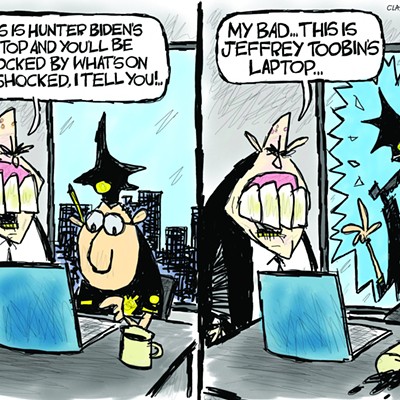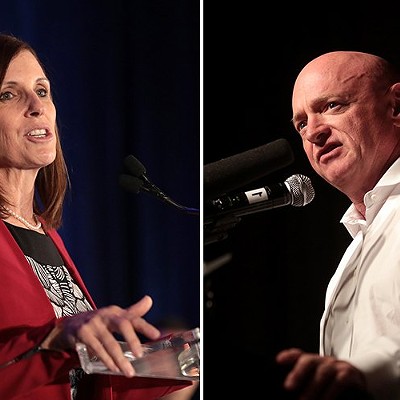Come March, Huckelberry may have dreamed, the cash-starved Diamondbacks would then jam in fans who would empty their wallets not for just snake stuff--shirts, hats, balls, trinkets for which the county gets nothing--but for beer, soda, lemonade, hot dogs, peanuts and pretzels, the concessions from which the county gets a cut.
Probably not.
What Huckelberry need not dream is that the success of concerts at Tucson Electric Park, the stadium centerpiece to the county's spring training complex at 2500 E. Ajo Way, may signal a push of the minor-league Tucson Sidewinders to the city's Hi Corbett Field.
Huckelberry and the builders of the county's record $950 million budget have made things look better at TEP, the spring training home of Diamondbacks as well as the home of their Triple-A affiliate, the Sidewinders.
Expenses have been pared.
The stadium and training complex, opened for the Diamondbacks and Chicago White Sox in 1998, still is $5.7 million in the hole. And annual debt payments will increase from a manageable $2.5 million to $3.8 million in two years and $4.1 million in nine years.
But under the optimistic budget that Huckelberry whipped past an unquestioning Board of Supervisors, revenues this year at the baseball complex are expected to hit $2.5 million--more than $1.1 million over expenses.
Part of the rosy budget is artificial.
The deficit had forced the county, in its first spring training and Triple-A venture, to cover costs at the baseball complex with money from the property-tax supported general fund that also pays for sheriff's deputies, other parks, pools, courts and judges and many other daily county operations. Huckelberry's budget waived the interest due to the general fund.
Moreover, $315,000 was taken from the county's surplus, fattened by high property tax rates combined with higher property values that includes new construction, to cover those payments. The county's baseball-related taxes, on hotel rooms, car rentals and RV space rentals, as well as baseball and ballpark shares have not produced enough money to save county property taxpayers from having to support baseball.
In the spring, the county can hope for the type of bump World Series winners provide their spring training hosts.
It would be a necessary boost.
Spring training attendance in 2001 was the lowest since the Diamondbacks and White Sox opened TEP three years earlier. Total tickets, for both teams, dropped 4.1 percent to 132,152. Last year's attendance was a drop of 8.5 percent compared with that for the first season. The Diamondbacks drew slightly more paid tickets last year, 76,111. That's up 1,707 from the previous year, but down 4,722 from the three-year high of 80,833 in 1999.
Parking revenue, at $24,838, was nearly $6,000 short of expenses, while the Diamondbacks and White Sox walked away with $78,048.
Concession revenue and concession rent both improved in the 2001 season compared with the previous season. Concession revenue hit $846,833, a 1 percent increase over figures for 2000. But that still is down from the 1999 concession total of $934,865.
DESPITE THE TITLE they wrested from the New York Yankees, the Diamondbacks are beset with financial problems that were revealed by Phoenix New Times' John Doherty in the midst of the World Series euphoria.
They won it in just their fourth season, the quickest of any franchise, but their future is heavily mortgaged with deferred player salaries, loans, franchise fees and huge cost overruns at Bank One Ballpark in the face of sharp drops in season ticket sales and attendance that have created consecutive operating deficits.
The affiliate, the Sidewinders, also have been losers since replacing the Tucson Toros and beginning play in 1998. Jay Zucker, whose fortune came from operating and selling Spanish-language broadcast outlets, lost more than $200,000 in his first year as owner, in 2000, and a similar amount this year. He bought the team from millionaire speculator Martin Stone, also a former owner of a Phoenix minor league team. Zucker can thank Stone for persuading Pima County Supervisors Raymond Carroll, a Republican, and Raúl Grijalva, a Democrat, and then-Supervisor Mike Boyd, a Republican, for approving in 1997 a lopsided lease that protects him from worse losses that instead are pinned on county taxpayers.
None of Zucker's marketing gadgets produced a turnaround--not the babysitting service, the kiddie rides, jumping castles or pitching booths. And not the Snake Pit bar, which was a dud, in looks and revenue.
The Sidewinders had a respectable season under popular manager Tom Spencer, who prepared several players for higher duty with the champion Diamondbacks as well as taking care of several stars who did rehab with the Sidewinders. But they finished last in attendance in the Pacific Coast League.
Zucker is more than a month late filing an annual report that the lease requires him to submit to the county. But in figures he released to the media in early September, attendance was listed at 246,991, or 3,653 a game for 67 home dates. It will depend on what figure is used, paid or turnstile, to determine how bad a hit taxpayers will take. If this year's attendance seems inflated it is because attendance last year, according to Zucker, was 270,832. Break-even under Stone's scheme was 250,000. Under attendance figures the county uses, the team has not topped 200,000. Provisions for county revenue do not kick in unless the team attracts 200,000.
"It is just a function of them finishing the work and us checking it over," said Tom Taylor, the administrative manager for the baseball complex.
Figuring splits on utilities is one holdup.
What is clear is that the county will lose money having the Sidewinders at TEP, which can hold 11,000, three times the team's average attendance.
Indeed, Huckelberry said two weeks ago that whatever small amount the Sidewinders will pay--$30,000 without offsets for the whole season if attendance is below 200,000--the county made more, $35,000, from the KFMA concert on June 17.
The county pulled in another $7,500 for a KRQ concert. And for parking lot rental for a weekend car sale, it made $6,000, more than half of what Zucker paid for parking for the Sidewinders season.
Zucker has made more promises to boost the Sidewinders.
But the announcement of Sidewinders general manager Rich Parr and field manager Al Pedrique seemed as off-base as some of Zucker's promotions. Both men come from the Diamondbacks' AA team in El Paso. To underscore the El Paso connection, Zucker hired a stagecoach and duded up to introduce them on October 25 at El Paso Barbeque, a chain restaurant at Broadway and Craycroft. The only connection the restaurant has to El Paso is the name. It is one of six (four are in Phoenix suburbs and another is in Tulsa) that are part of a Newport Beach, Calif., operation that grew out of Furr's.
MEANWHILE, THE Sidewinders' poor performance in attendance and revenue at TEP, combined with nostalgia, is causing some to think of a move to Hi Corbett, which the Toros used until Stone renamed and moved them.
City Parks Director Dan Felix, who also headed county parks and recreation as the county entered the baseball business, says Zucker and his people have looked over Hi Corbett, which seats 7,500.
"I think everybody in the community wants to keep the Sidewinders in Tucson," Felix says.
The evaluation of Hi Corbett, in Reid Park, was not in detail, Felix says, because of existing contracts with the Colorado Rockies for spring training and USA Baseball in the summer.
The Rockies pay the city an annual fee of $80,000, with up to $30,000 offset by ushering and guest relations, that reduced by direct costs. The city also gets parking revenue, and money from a $1 ticket surcharge. The Rockies, who in their first year replaced the Cleveland Indians at Hi Corbett in 1993, receive income from concessions and souvenirs as well as broadcast and advertising revenue. Ten outfield signs, however, are reserved for the city.
USA Baseball has used Hi Corbett for four years, but officials said in May that travel problems--cost and poor connections to Tucson--forced it to evaluate other cities. The city receives $12,000 a year, plus $500 a game and a minimum of $2,000 in shares of ticket revenue from USA Baseball, according to the city's contract with the organization. Revenue is low enough that even the Sidewinders could be an improvement, depending on the structure of the contract.
The city allowed the Toros to keep all ticket, parking, program, advertising, broadcast, concession and souvenir revenues under a lease approved by the City Council in 1988, and the Toros were to pay the city $750 per game. But there were numerous allowances for offsets for facility work and improvements made by the Toros.












